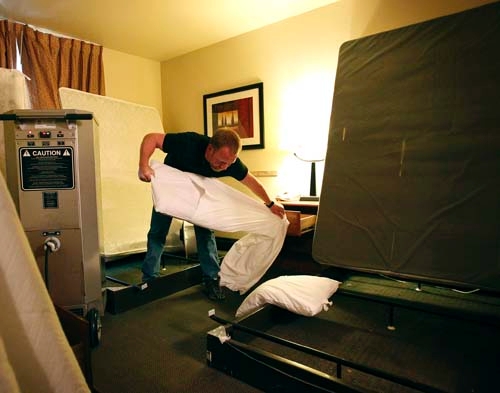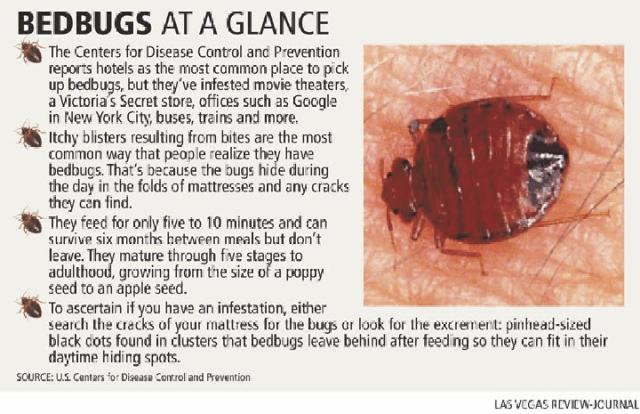Area hotels work to avoid the bedbugs’ bite
Todd Nelson usually sits in his unmarked, windowless white van to watch the hotel room mere paces away, closely monitoring the interior by placing devices inside that transmit to his laptop.
But for Tuesday's stakeout, he's hiding in the next hotel room with his laptop and extra matchbox-sized devices fitted snugly into the foam of a large plastic case. He's been waiting three hours.
"Anything above red is dead," Nelson says, pointing at the computer screen.
It's time to enter the room he's been watching. The couch is turned on its side and propped against the wall. Kitchen cabinets and drawers are all open. The headboard is off the wall, and the mattress is against the wall, the thin ticking on the bottom cut open. And the inside door handle is hot to the touch. The room itself is like a sauna.
No one's here. But something is.
Bedbugs.
That's why Nelson is at this Henderson motel. While still not publicizing the fact, many valley hoteliers have begun to aggressively fight the tiny bugs, realizing it's a pest that won't go away on its own but only multiply.
"This hotel owner called me and said, 'I got some complaints. Get down here,' " said Nelson, general manager of Bed Bug Thermal Solutions, who charges $1,000 per hotel room to get rid of the bugs. "Hotels weren't so proactive a couple years ago."
Nelson uses a generator, 125-pound heaters and fans to kill the country's most difficult pest to exterminate. His computer monitors temperatures throughout the room, making sure every square foot is hot enough.
Hot enough is 130 degrees.
"At 115, they come looking for the meal," he said. "At 120, they start dying out."
Such unusual practices are needed because bedbugs have grown resistant to "almost all pesticides" made to treat them, according to the U.S. Centers for Disease Control and Prevention. Instead, exterminators manually vacuum the bugs and eggs or use heat.
RESURGENCE FROM THE EAST
The CDC reports that bedbugs were nearly eradicated in industrialized countries such as the United States up until a few years ago. The first U.S. reports of the resurgence came from the East Coast. Bedbugs infested more than a dozen New York City schools and part of the Empire State Building.
About three years ago, Las Vegas exterminators noticed an uptick in bedbug calls, according to Gregg Wears, environmental health supervisor for the Southern Nevada Health District. The exact extent of Las Vegas' infestations remains unknown. All the evidence is anecdotal because neither the district nor any U.S. agency tracks bedbug cases. And hotels -- well known as the source of many infestations -- aren't required to report cases.
That's because until a couple days ago, bedbugs weren't known to spread diseases, unlike other bloodsuckers.
"They are a nuisance," Wears said. "They itch like the dickens but aren't a health concern."
'IT'S NOT TIME TO PUSH THE PANIC BUTTON'
However, Canadian scientists detected drug-resistant staph bacteria in bedbugs from three hospital patients in a downtrodden Vancouver, British Columbia, neighborhood, according to a CDC report released last week.
"It's not time to push the panic button," said Marc Romney, one of the study's authors, adding that it's unclear whether the bacteria originated with the bedbugs or were merely picked up from the people. The bacteria often are seen in hospitals.
"This is an eye opener," said Wears, adding that it might be cause for the CDC to initiate a bedbug tracking system, depending on findings of follow-up research. "We're in wait-and-see mode right now."
Nevertheless, Wears hypothesizes that bedbugs are on the decline in the Las Vegas area based on continually decreasing bedbug complaints. In large part, this is attributable to hotels no longer trying to sweep bedbugs under the rug, so to speak, as they were during the initial boom of a few years ago, said Wears, who was the Strip supervisor for the past 6½ years. More and more hotels are dealing with bedbugs head on, which is the only way to eradicate the persistent and quickly multiplying bug.
Nelson works with hotels on a regular basis, ranging from mom-and-pop operations to megaresorts, and has also noticed a shifting in many Las Vegas hoteliers' attitudes -- out of necessity. That's because the public has awakened to the bedbug invasion. And they want to know what their hotel is doing about it.
A hotel Nelson worked for received 30 cancellations because the front-desk person gave the wrong answer to a question about bedbugs.
"The odds of getting bedbugs is like pulling the slots lever here in Vegas," Nelson said. "It's just bad luck. But everyone right now is assuming that everyone has them."
One in five Americans has experienced a bedbug infestation or knows someone who has encountered bedbugs, according to the National Pest Management Association, which surveyed adults across the country in November. The association also surveyed 1,000 pest exterminators last spring and found that 95 percent encountered bedbug infestations in the past year, also forcing them to become educated on a pest many had never seen before.
TAKING THE OFFENSIVE
Many local hotels have realized that to keep their image untarnished they can no longer ignore bedbugs but must embrace their resurgence, according to Nevada State Entomologist Jeff Knight, who often speaks to hotels on the issue. He said many hotels are developing bedbug programs so that when guests ask, they're prepared with the right answer. These programs often entail a quarterly check by exterminators, training housekeepers to spot bedbugs and training customer service employees on answering questions.
Wynn Resorts is doing all of this and more. The hotel has its own canine unit for sniffing out bedbugs.
"In light of our efforts, we can state with confidence that our resorts are free of bedbugs," spokeswoman Deanna Pettit said.
MGM Resorts International, which has 35,200 rooms on the Strip, designs its rooms to give bedbugs the fewest places to hide, trains staff to inspect rooms and hires professionals to quarterly check its rooms. As a result, MGM claims it hasn't seen an increase in bedbugs despite the national resurgence, according to spokeswoman Yvette Monet.
This proactive approach is encouraging to Kurt Trombetti, president of the Nevada Pest Control Association and owner of Enviro Safe Pest Control. Otherwise, it wouldn't take long for Las Vegas to be overrun.
"Where you have travel, you're going to have bedbugs," he said of the parasites that hitchhike on people's clothing. "And we're an entertainment capital of the world. Frankly, we have to be proactive."
He has definitely noticed more bedbug business in recent years but nowhere near the boom back East. He attributes that to Las Vegas hoteliers moving to the front lines, not hiding and hoping to go unnoticed and unharmed. For example, the state pest control association is hosting a bedbug workshop on May 24 for hotels and property managers. Trombetti said he expects representatives from every major hotel there, about 500 total.
The workshop is being repeated at 15 cities across the country through May, the first effort of its kind solely to battle bedbugs, a spokesperson for the National Pest Management Association said.
MORE JOBS THAN HE CAN HANDLE
That's good news for Nelson who has more jobs than he and his white van can handle. He received four Las Vegas house calls while working at the Henderson hotel Tuesday and has to drive to Pocatello, Idaho, by Thursday. Then, it's off to Jackson Hole, Wyo.
"Jesus, I'm never going to get home," he said.
You might see him driving down the road with a magnetic sign reading "Bed Bug Thermal Solutions" stuck to the side of his van. But within five miles of any job, he stops and pulls the magnet off. Time to go undercover.
Contact reporter Trevon Milliard at tmilliard@reviewjournal.com or 702-383-0279.



















